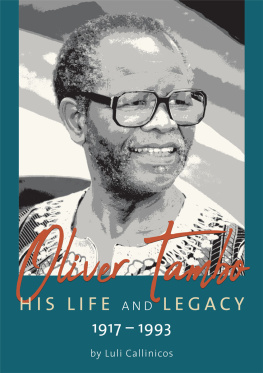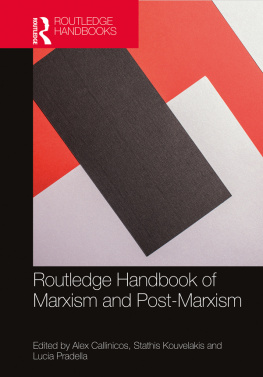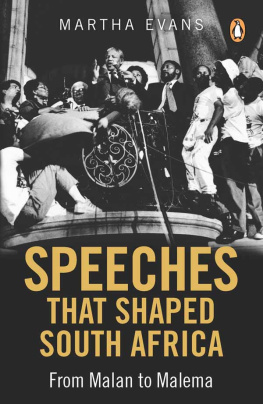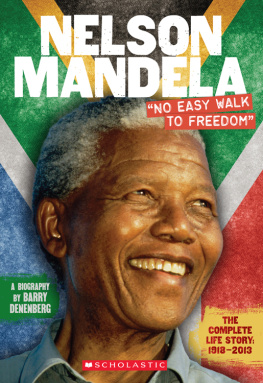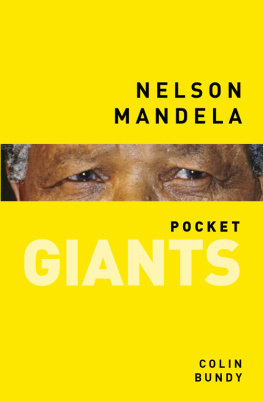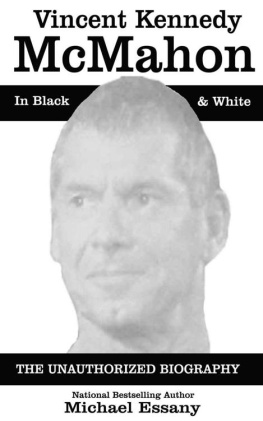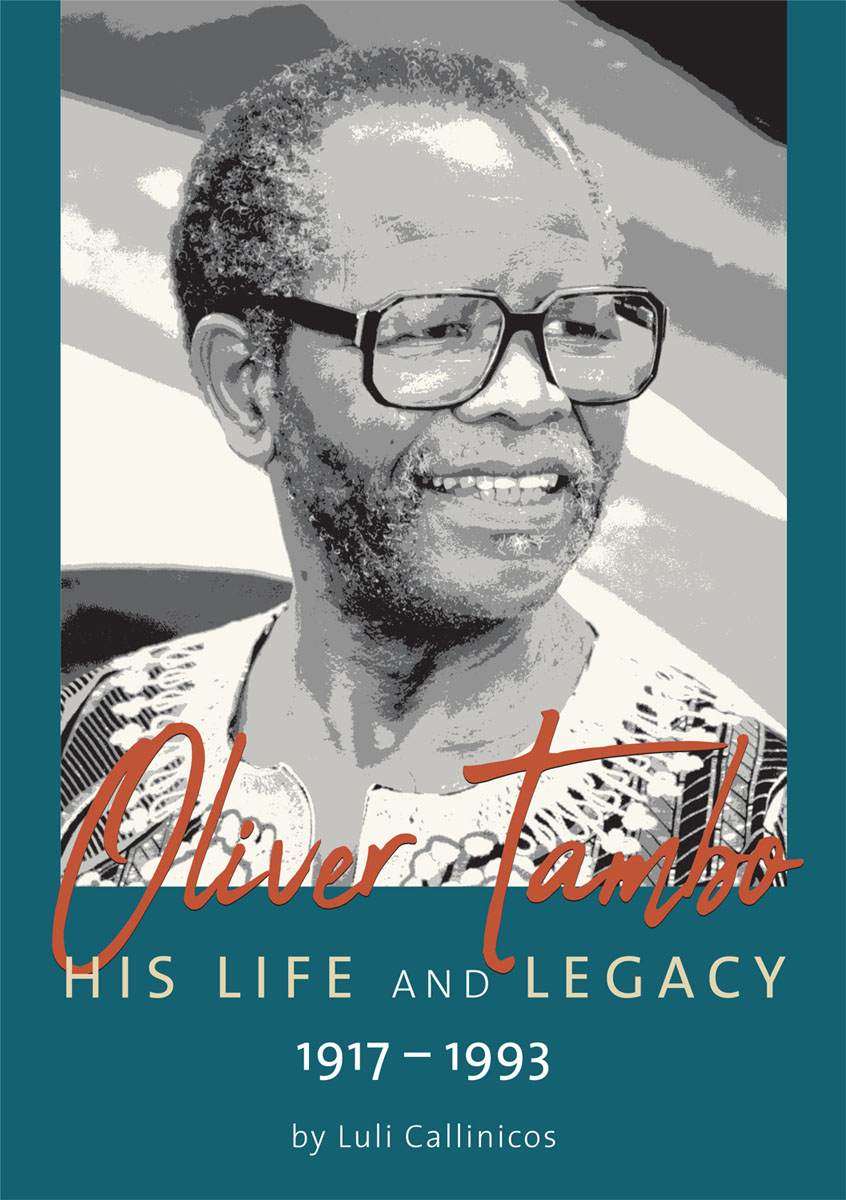

Published by Real African Publishers
PO Box 3317
Houghton
Johannesburg 2041
3rd Edition
Published December 2018
First published by STE Publishers 2002
ISBN: 978-1-928341-92-5
Luli Callinicos
Printed and bound in South Africa
All rights reserved. Without limiting the rights under copyright reserved above, no part of this publication may be reproduced, stored in or introduced into a retrieval system, or transmitted, in any form or by any means (electronic, mechanical, photocopying, recording or otherwise) without prior written permission of both the copyright holder and the publisher of the book.
This book is sold subject to the condition that it shall not, by way of trade or otherwise, be lent, re-sold, hired out or otherwise circulated without the publishers prior consent in any form of binding or cover other than that in which it is published and without a similar condition being imposed on the subsequent purchaser.

OLIVER REGINALD TAMBO , leader of the African National Congress in exile for 30 years, died on 23 April 1993. Yet, his legacy lives on. Comrade O. R. left us a significant and enduring heritage: one that enhanced our new constitution, contributed to the inclusive and equitable policies of our democratically elected government, and affirmed the abiding vision of the ANC itself.
The African National Congress has produced leaders of the highest calibre, but Oliver Tambo, thoughtful, wise and warm-hearted, was perhaps the most loved. His simplicity, his nurturing style, and his genuine respect for all people seemed to bring out the best in them. Comrade O. R.s life was remarkable for the profound influence he had on the ANC during the difficult years of uncertainty, loneliness and homesickness in exile. During his 50 years of political activity in the ANC, Comrade O. R. (as he affectionately came to be known) played a significant role in every key moment in the history of the movement, until his death. Oliver Tambo was a founder member and secretary of the ANC Youth League in 1944, the general secretary of the ANC from 1952, and was elected deputy president of the ANC in 1959. He was formally mandated by the ANC to be the leader of its Mission in Exile in 1960 and formally became the president of the ANC from 1977 until 1990. Then, on his return to South Africa, he was elected as national chairperson, a new position created specially for him, until his death in 1993.

Nkantolo landscape, showing the remains of the Tambo homestead
What shaped the life of Oliver Tambo? What values and life skills enabled him to make such an important and enduring impact on the history of the African National Congress and on our new, democratic South Africa? Two major processes in Comrade O. R.s early life moulded his style in politics and leadership his traditional rural roots and the expertise he acquired through education. Each experience was different, yet, O. R. combined them creatively to develop an approach that was able to reach and empower a broad mass of the people, both nationally and internationally.

Nkantolo homestead, Pondoland
One an early summer morning on 27 October 1917, in the small village of Nkantolo, about 20 kilometres from Mbizana Pondoland, a son was born to Mzimeni, son of Thambo, and his third wife, Julia.
Pondoland, known for its green, fertile and available land, had been the last chiefdom in South Africa to remain independent. The annexation of Pondoland had taken place within Oliver Tambos parents lifetime. It was an act that completed the process of colonial dispossession of South Africa. Oliver Tambos father was acutely conscious of that British assault on Pondoland: the naming of his son, Kaizana, after Britains powerful enemy, the Kaizer of Germany during World War One, was making a pointed statement.
The Tambo homestead was unusually large: a big kraal, as distinct from a two-hut home, of which there were many, remembered O. R. The homestead consisted of the paternal grandparents, their three sons, and their wives and children. Olivers father, Mzimeni, who was not a Christian, had four wives (though he married his youngest wife Lena only after his second wife died in labour). It is a tribute to my father that family relationships were harmonious, recalled O. R. The wives had an excellent relationship, and the 10 children were very close. Mzimeni was comfortably off. He owned at least 50 cattle at one time, several fine horses and an ox-wagon. Those resources led to trading and transport opportunities. Mzimeni was not literate my father had not seen the inside of a classroom. His prosperity was largely due to his own enterprise. Shrewd, creative and quick to seize an opening, Mzimeni sought and gained employment as an assistant salesman at the nearby trading store. That exposure to a more commercial economy taught Mzimeni a number of skills and widened his world.

A herdboy and his father, circa 1939

The Chiefs Great Place, Nkantolo. An ecstatic local community welcome O. R. on his arrival, January 1993
Two women in O. R.s life, his mother Julia and his fathers third wife, were Christians. They also opened up new horizons. Olivers mother was a sociable and energetic person who could read and write. She established her home as the local headquarters of the Full Gospel Church. Tambo recalled occasions when there were large, bustling gatherings of worship in his mothers hut. Eventually, perhaps because of her influence, Mzimeni converted to Christianity and had all of his dependents baptised.
In that somewhat large and busy homestead, Kaizana had an active, happy and traditional childhood.
From as early as three or four years old, young Kaizana was learning the essential skills of the rural economy and the practical discipline that went along with it. Tambo vividly recalled the duties of the small boys, describing their fairly heavy responsibilities in tending the calves and ensuring that the animals were permitted to suckle only after milking. As the boys grew older and were able to accept more responsibility, they were given the task of herding the cattle.

The trading store of Nkantolo. The village was named after the local post office die kantoor the only one for miles around
The young Tambo took pride in taking responsibility for more grown-up tasks. He learnt to plough; he mastered the difficult craft of spanning a team of oxen. He taught them to obey commands in such a way that the whole team pulled together.
Everyone in the family contributed to the homestead economy. Work was practical and rewarding. Unlike labour in industrial society, it was not separated from home or community. Herding, like other productive activities, would be done in groups and would include social interaction and cooperation.
Next page
